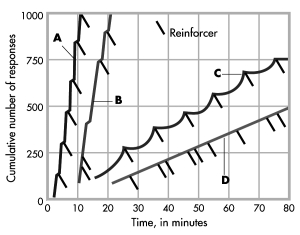Exam 5: Learning
Exam 1: Introduction and Research Methods706 Questions
Exam 2: Neuroscience and Behavior550 Questions
Exam 3: Sensation and Perception620 Questions
Exam 4: Consciousness and Its Variations681 Questions
Exam 5: Learning502 Questions
Exam 6: Memory538 Questions
Exam 7: Thinking, Language, and Intelligence460 Questions
Exam 8: Motivation and Emotion710 Questions
Exam 9: Lifespan Development691 Questions
Exam 10: Personality455 Questions
Exam 11: Social Psychology462 Questions
Exam 12: Stress, Health, and Coping482 Questions
Exam 13: Psychological Disorders588 Questions
Exam 14: Therapies541 Questions
Select questions type
Take B. F. Skinner's viewpoint of free will and respond to the assertion that you consciously choose to answer this essay question.
(Essay)
4.9/5  (38)
(38)
Researchers found that people easily acquire a conditioned fear response to pictures of snakes and spiders when the images were paired with a mild electric shock. However, people did NOT easily acquire a conditioned fear response to pictures of flowers and mushrooms when these images were paired with a mild electric shock. Which perspective provides the best explanation for this finding?
(Multiple Choice)
4.9/5  (37)
(37)
How did Edward Tolman demonstrate the role of mental processes in operant conditioning?
(Essay)
4.7/5  (36)
(36)
The radio program Entrelazado, which is Spanish for "entwined," encourages healthy behaviors, including prevention of obesity and tobacco use, among the local Hispanic population. These entertainment-education programs use the principles of:
(Multiple Choice)
4.8/5  (44)
(44)
B. F. Skinner advocated that totalitarian governments should shape all human behavior through the use of punishment, believing that this approach would solve human problems in a humane and rational way.
(True/False)
4.9/5  (33)
(33)
Which famous psychologist said the following? "It became my mission in life to help create a positive psychology whose mission would be the understanding and building of positive emotion, of strength and virtue, and of positive institutions."
(Multiple Choice)
4.9/5  (33)
(33)
What happened after "Little Albert" was classically conditioned to fear a tame white rat?
(Multiple Choice)
4.7/5  (30)
(30)
You take two aspirin to relieve a headache. Thirty minutes later, the headache is gone. You are now more likely to take aspirin to deal with bodily aches and pains in the future. In other words, _____ has occurred.
(Multiple Choice)
4.9/5  (37)
(37)
A movement called _____ advocates turning daily life into a kind of virtual reality game, in which points or other conditioned reinforcers are awarded to reward healthy or productive behaviors.
(Multiple Choice)
4.9/5  (41)
(41)
The different schedules of reinforcement produce different patterns of responding. In the graph shown, the fixed-interval schedule of reinforcement is reflected in which pattern of responding?

(Multiple Choice)
4.9/5  (34)
(34)
To enhance the effectiveness of positive reinforcers, you should make sure the reinforcer is reinforcing to the individual whose behavior you want to modify.
(True/False)
4.8/5  (39)
(39)
Prior to conditioning, a dog will salivate in response to food placed in its mouth. Using classical conditioning terms, the food would be labeled the _____, while the dog salivating would be labeled the _____.
(Multiple Choice)
4.7/5  (39)
(39)
According to Bandura's model of observational learning, which of the following characteristics of television depictions of violent behavior makes the violent behavior more likely to be imitated?
(Multiple Choice)
4.8/5  (28)
(28)
Pavlov found that a conditioned response would be stronger if:
(Multiple Choice)
4.8/5  (37)
(37)
In training various animals to perform tricks, Marian and Keller Breland discovered that certain natural behavior patterns interfered with the operant behaviors they were attempting to condition in some animals, a phenomenon called instinctive drift.
(True/False)
4.9/5  (43)
(43)
Identify the learning researcher who said, "The animal behaves like a scientist, detecting causal relations among events and using a range of information about those events to make relevant inferences."
(Multiple Choice)
5.0/5  (31)
(31)
Psychologist Martin Seligman proposed that humans are biologically predisposed to learn to fear certain objects or situations that may have once posed a threat to humans' evolutionary ancestors.
(True/False)
4.8/5  (38)
(38)
Russian physiologist Ivan Pavlov accidentally discovered the process of classical conditioning while studying the role of saliva in digestion.
(True/False)
4.8/5  (36)
(36)
As studies with rats have shown, taste aversions can be produced when the interval between the conditioned stimulus and the unconditioned stimulus is:
(Multiple Choice)
4.7/5  (39)
(39)
Showing 61 - 80 of 502
Filters
- Essay(0)
- Multiple Choice(0)
- Short Answer(0)
- True False(0)
- Matching(0)